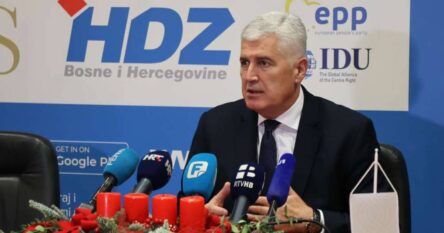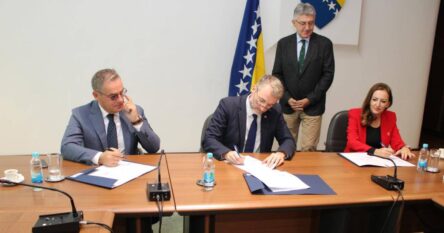Head of EU Delegation
Johann Sattler for Fokus.ba: The Rule of Law in BiH is the most important thing for the EU

Head of the Delegation of the European Union to Bosnia and Herzegovina Johann Sattler addressed key issues in our country for Fokus.ba
The most difficult ones are, of course, related to the migrant crisis and the judiciary system. When it comes to the migrant issue, where Sattler is personally highly involved, he has once again pointed out the responsibility of local authorities.
AUTHOR: AMIL DUČIĆ
The European Union Special Representative in Bosnia and Herzegovina also commented on EU funds and how they are spent and whether the efficiency of their implementation is monitored.
We asked Sattler if Milan Tegeltija's departure from office has solved the problems in the High Judicial and Prosecutorial Council of BiH (HJPC), as well as about crucial laws which are obligatory in order for Bosnia and Herzegovina to become a candidate for the European Union.
Fokus: Who is responsible for the current events regarding migrants in Krajina? Not long ago, you cut your vacation short to work on the situation in which 1.700 people were left without a roof over their heads. you also had a meeting in Krajina with minister Cikotić.
Sattler: I believe what we saw in the past few weeks is an unnecessary humanitarian crisis. It was avoidable. I'm not talking about huge numbers here for the whole country. It's around eight thousand people. That is something which could be solved. It is not my job to find the ones responsible. My job is to create urgent solutions for people out in the cold. I can say that after yesterday's visit, I am more confident that we are closer to ensuring that these people have a roof over their heads.
In the meantime, we provided accommodation for 750 migrants in heatable tents with sanitation. These conditions are already better than what they had before. Unfortunately, many others are still in the woods, in the open or in abandoned buildings, so we are still working with the local authorities to solve this in the coming weeks.
First important goal achieved – 750 migrants/refugees are now placed in heated tents in #Lipa. Next steps:
➡️protection for those in makeshift tents around #Bihać
➡️fairer burden sharing across ??. ?? will continue to assist. pic.twitter.com/pmKHJyAFJD— Johann Sattler (@josattler) January 13, 2021
Fokus: Along with other ambassadors, you held meetings with state officials. Are there any signs of a long-term solution? What about requests of dispersing the migrant crisis on the whole territory of Bosnia and Herzegovina?
Sattler: That is an important question. The key focus at this moment is saving human lives. It goes without saying that every human life is precious. Of course, we have to work to ensure long-term solutions which will prevent the same crisis from happening for the third time in a row, in winter conditions. The entire Europe knows about Bira and Lipa now, and these are definitely events which we do not want to see repeat.
We want long-term solutions, and these solutions imply a fairer distribution of the burden of the migrant crisis. The burden is currently on two cantons – Sarajevo and Una-Sana, in the country which has ten. Of course others have to find solutions to share the burden. These are difficult questions, but we are working on them and, hopefully, we are going to come to a solution.
Fokus: On the other hand, the media is asking whether IOM is to blame, because they did not fulfil their duties, even though they are generously funded by the European Union. What is your opinion on that? Is the EU really funding them generously, and are these funds adequately spent? Some go as far as calling the EU hypocritical. What do you think about these comments?
Sattler: First of all, this is the obligation of Bosnia and Herzegovina. That is often overlooked. Everyone thinks the international organizations such as IOM, UNHCR or EU have to care about these issues. That perception is wrong. BiH, a signatory of multiple international conventions, including UN conventions, and an aspiring EU country, needs to handle issues such as the migrant crisis, and provide asylum. We have been insisting on this for years, but so far, little has been done.
The European Union has been helping BiH for three years. Our funds have different purposes, and one part goes to international organizations such as IOM, UNHCR, DRC etc. We get monthly financial reports, we have external and internal audits. The spending of these funds is scrutinised very meticulously. Aside from international organizations, we help build facilities and provide assistance to institutions such as the Ministry of Security, Service for Foreigners’ Affairs, Border Police, local Ministry of Internal Affairs in Una-Sana, as well as the Ministry of Health in Una-Sana.
A lot of aid goes in that direction. It is important to underline that we track the funds and how they are spent. You cannot blame IOM for migrant centers such as Bira that have been closed even after the Council of Ministers’ decision. It is up to the local government to find accommodation for migrants.
Chaired a meeting today with ?? Defence and Security Ministers on securing immediate and adequate shelter for migrants in Lipa. Time is of essence for hundreds left out in the open. pic.twitter.com/Clpr6HpLm8
— Johann Sattler (@josattler) January 4, 2021
Fokus: The European Court of Auditors has started checking whether EU funds intended for strengthening the rule of law have been implemented efficiently in BiH and other countries in the Western Balkans. Did the funds have any effect?
Sattler: Rule of law is certainly the most important area in which we invest, because we want to see BiH progress. It is a priority we set for all countries that want to join the EU. It is the first chapter you open when starting negotiations, and the last one you close. As you mentioned, we have invested substantial funds, and of course, there are regular checks as well as additional audits on these funds. We closely track the funds’ implementation and the results in BiH. One of the examples is the High Judicial and Prosecutorial Council. It is a fact we have not been satisfied with it's work in the past years.
Fokus: Not long ago, you stated that BiH was one of the first to apply for Covid-19 vaccines, and that we will not be the last to obtain it. However, the situation looks different today. What is your comment on that? While other countries are directly buying the vaccines from suppliers, BiH is not doing that.
Sattler: The acquisition of vaccines is probably the most difficult issue, not only in BiH, but in the region and in the whole Europe, and understandably so. The goal is to get out of this corona-crisis which has severe consequences on our daily lives. One of the ways to do so is through vaccination. As far as BiH is concerned, there was a deadline which has, unfortunately passed, but the upside is that it has not had a long term negative effect on BiH's inclusion in the plan. There are two plans in order, one through COVAX for which BiH has applied and already paid for, and the other through the EU, which implies direct aid to BiH from our member states.
Fokus: The past year will not only be remembered because of the pandemic, but also the malfeasance surrounding the acquisition of medical equipment. Who can guarantee something similar will not happen with vaccines in 2021?
Sattler: That is a question for Bosnian and Herzegovian authorities. Once again, this is why rule of law is the most important issue in the whole process of EU integration. The EU has invested around 700 million Euro into this throughout six countries in the Western Balkans. Naturally, transparency and responsibility are key principles which may not come into question even in emergencies and crises. We will continue tracking those funds.
Fokus: For years, the EU Delegation and OSCE have been assisting in the implementation of key judicial solutions, such as the Public Procurement Law and the Law on the Prevention of Conflict of Interest, so that BiH can stay on it's European path. It is apparent that the authorities are either trying to obstruct the proposed judicial solutions or buy enough time by suggesting new drafts that do not contain these regulations. What is your opinion on this?
Sattler: These are all highly important laws which are a part of the 14 key priorities for Bosnia and Herzegovina on it's European path. There have been advancements in the last year, notably the elections in Mostar, forming the parliamentary Commision for stabilization and association etc. The laws you mentioned are of key importance for us.
I am disappointed that the laws have not been adopted even though they have been in the discussion for a year, if not longer. When it comes to conflict of interest, one version has been adopted in the House of Representatives in the Parliamentary assembly of BiH. I think that is a solid solution. Now it is up to the other House to adopt it. In any case, these legislative solutions need to be up to European standards. I call upon the legislators and the Council of Ministers to speed up the process and work on these legislative solutions. The Chairman of the Council of Ministers Zoran Tegeltija gave me hope after saying that these laws will be adopted in the near future. I hope it will happen. As you said, the Public Procurement Law is of key importance.
Fokus: Milan Tegeltija, burdened by multiple affairs, is no longer the president of the HJPC. There is now a notion that there are no further issues to solve in this judicial body?
Sattler: Well, that notion is far from the truth. There are many issues to solve there. First of all, we should ensure there are amendments to the Law of HJPC that should be implemented regarding the integrity of the judicial officials, which is one of our main conditions for continuing macrofinancial aid. The Ministry of Justice has sent it's version to the Venice Commission to check if it's up to EU standards. I hope the answer will come soon. I repeat, these are integrity checks for the highest judiciary officials. As far as other amendments go, there are different ideas. Overall, I reckon everyone agrees this is the problem, because the public is dissatisfied with the judiciary and the HJPC. This process has been going on for two years and now we need a concrete realization of our arrangements for HJPC. When compared to other aspects, polls have shown that the Judiciary is the lowest rated in the public opinion. A majority of citizens, 70 or 80 percent, do not trust any level of the judiciary.
Fokus: The election of Joe Biden as the president of the USA seems to imply that the USA and the EU will work together and with synergy when it comes to BiH. What is your opinion on that? How do you perceive Germany's aspirations to appoint the new High representative in BiH?
Sattler: The new US administration is good news for transatlantic relations in general, as well as for Western Balkans. I have faith, and I hope for an even closer cooperation. The USA has a strong interest and an important role in BiH. Even until now, especially last year, we had a good working relationship which made the elections in Mostar possible. That is the result of a constructive cooperation we have with the Americans.
The sun shines on #Mostar today! Happy to be here on this historic day with Mostarians who can finally exercise the democratic right & choose their local authorities – the 1st time after 12 years. #GlasajSigurno? #biraMO? pic.twitter.com/EAHjvxNEV5
— Johann Sattler (@josattler) December 20, 2020
We want to cooperate with the USA and with all other constructive forces which are working to enable this country to progress and lead BiH to the EU, which is an aspiration for 80 percent of the people here.
When it comes to the High representative, the EU is represented in the Peace Implementation Council (PIC) and even though it is not official yet and I can not speculate, I can once again emphasize the role of Germany and its engagement in the region. I have witnessed it firsthand in the Berlin process and during Germany's chairmanship in the EU.












 Vučić se svađao s osobom sa invaliditetom zbog penzije, nervozno vikao pred punom dvoranom
Vučić se svađao s osobom sa invaliditetom zbog penzije, nervozno vikao pred punom dvoranom  Milorad Dodik se oglasio o Vučićevoj “noćnoj mori”: Srpski narod mora biti svjestan lekcija iz svoje istorije
Milorad Dodik se oglasio o Vučićevoj “noćnoj mori”: Srpski narod mora biti svjestan lekcija iz svoje istorije 